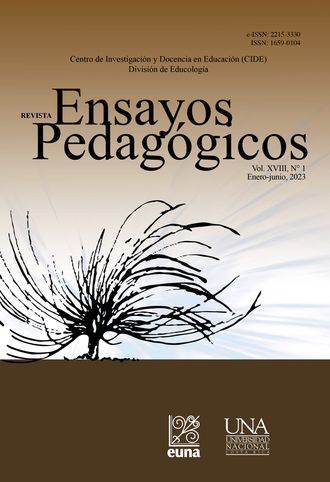A Reflection on the Profile of the Students of the Baccalaureate in the Teaching of English for I and II Cycles from UNA in Relation to the Rural Context of the Multigrade School in Costa Rica
DOI:
https://doi.org/10.15359/rep.18-1.5Keywords:
English, major, school, teacher, teachingAbstract
This academic essay aims to generate a reflection on the profile of the students of the major of English Teaching for I and II Cycles of the Universidad Nacional, in response to the multigrade school as an educational context in Costa Rica. For this, it begins with a brief historical review, as a contextualization, of the importance of the major being a pioneer in the incorporation of this type of primary educational institution in the formation of its university students. Subsequently, a mention is made about the pedagogical competences, at the level of professorship and baccalaureate, as a profile of the students of the major. In addition, a description of the characteristics of the single-teacher school is included, which must be considered within the training and professional awareness of the student body. Finally, it is mentioned how the program has been strengthening the professional profile of its students through The Umbrella English Teaching Project, the inter-unit work between the Basic Education Department [División de Educación Básica - DEB] and the Rural Education Department [División de Educación Rural - DER], and the participation of the student body in pedagogical activities of didactic and investigative training.
References
Abós, P., Boix, R. y Bustos, A. (2014). Una aproximación al concepto pedagógico de aula multigrado. Aula, 229, 12-16.
Ames, P. (2018). Los aprendizajes de los niños rurales en grupos multiedad y su uso en la experiencia escolar multigrado. DESidades, 6(21), 60-69. https://desidades.ufrj.br/es/featured_topic/los-aprendizajes-de-los-ninos-rurales-en-grupos-multiedad-y-su-uso-en-la-experiencia-escolar-multigrado/
Angulo, L., Carvajal, V., Cerdas, Y., Méndez, N., Morera, D., Torres, N. y Van, P. (2008). Formación docente para la educación básica. URUK Editores.
Ángulo, L., Cerdas, Y. y Ovares, S. (2004). El aula rural: un espacio para aprender juntos. Revista Electrónica Educare, 7, 173-190. http://doi.org/10.15359/ree.2004-7.10
Angulo, L., Morera, D. y Torres, N. (2010). El proceso pedagógico de la escuela rural unidocente y multigrado centroamericana. URUK Editores.
Alvarado, R. y Maya, A. (2009). La escuela unidocente: un reto y una oportunidad para la educación en la comunidad rural. Editorama.
Álvarez, G., Badilla, I., Benavides, B., Domian, C., Fallas, J., Guzmán, N., Loaiza, M., Madrigal, I., Miranda, R., Rodríguez, S., Saborío, I., Sisfontes, P., Valenzuela, N. y Vásquez, E. (2015). Plan de estudios de la carrera Bachillerato en Enseñanza del Inglés para I y II Ciclos con salida lateral de Profesorado (Rediseño). Universidad Nacional.
Díaz, M. y Solano, J. (2002). Educación unidocente: miradas desde la práctica. CIDE, División de Educación Rural.
División de Educación Básica. (2018). Información general. http://www.cide-basica.una.ac.cr/
García, J. y Alvarado, R. (2011). Tercer informe Estado de la Educación. Las escuelas unidocentes en Costa Rica: fortalezas y limitaciones. CONARE.
Instituto Nacional de Estadística y Censos. (2018). Clasificación de distritos según grado de urbanización. Metodología. https://admin.inec.cr/sites/default/files/media/imgmetodologia-indiceurbru_2.pdf
Ministerio de Educación Pública. (2016). Educar para una Nueva Ciudadanía: Programa de Estudio de Inglés Primer Ciclo de la Educación General Básica. https://www.mep.go.cr/sites/default/files/programadeestudio/programas/ingles1ciclo.pdf
Ministerio de Educación Pública. (2017). Circular DDC-0144-01-2017: Disposiciones para el planeamiento didáctico unidocente. https://www.mep.go.cr/sites/default/files/page/adjuntos/circular-ddc-0144-01-2017.pdf
Miranda, G., Jiménez, R. y Villalobos, L. (2004). Plan de Estudios de la carrera Bachillerato en la Enseñanza del Inglés para I y II Ciclos con salida lateral a Diplomado. Universidad Nacional.
Programa Estado de la Nación. (2021). Octavo estado de la educación 2021. CONARE-PEN. https://estadonacion.or.cr/wp-content/uploads/2021/09/Educacion_WEB.pdf
Programa Estado de la Nación. (2017). Sexto informe estado de la educación. PEN. https://hdl.handle.net/20.500.12337/665
Solano, J., Van, P. y Ovares, S. (2003). El docente rural en Costa Rica. Radiografía de una profesión. EUNA.
Torres, N., Díaz, M. y Miranda, G. (2013). Nueva ruralidad y educación rural. La pedagogía rural ¿Una asignatura pendiente? CIDE. División de Educación Rural.
Uttech, M. (2001). Imaginar, facilitar, transformar. Una pedagogía para el salón multigrado y la escuela rural. Paidós Mexicana.
Valencia, L. (2015). Estereotipos y educación rural: visibilizando los hilos que tejen el sentido de la educación en el campo. [Tesis de maestría, Universidad de Antioquia]. Repositorio Institucional Universidad de Antioquia. https://bibliotecadigital.udea.edu.co/bitstream/10495/6484/1/ValenciaLeidy_2015_EducacionRural.pdf
Winter, C. T. y Hernández, R. (2004). El rol del profesor en la educación rural. https://www.aacademica.org/v.congreso.chileno.de.antropologia/67
Published
How to Cite
Issue
Section
License
Ensayos Pedagógicos is subscribed to the Attribution-NonCommertial-NoDerivatives 4.0 International Creative Commons Licence, which allows both authors and readers to freely download, store, copy, and distribute the final approved publisehd version of the manuscript (post-print) as long as this is done without commercial purposes, no derivative works are generated, and the source and author are mentioned. As well, Ensayos Pedagógicos declares that authors will remain the rightful owners of the copyrights of their work in perpetuity.







